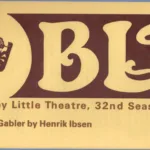Season 32 Play 6 – Hedda Gabler by Henrik Ibsen
Directed by
Cast
Hedda Tesman (his wife) – Jackie Firth
Miss Juliana Tesman (his aunt) – Nora Green
Mrs. Elvsted – Jenni Gillgrass
Judge Brack – Roland Coombs
Eilert Loevborg – David Helliwell
Bertha – Mary Newton
Synopsis
..
Directors Notes
There is a delightful moment in Juno and the Paycock when Joxer notices some books on the table A Doll’s House, The Wild Duck and Ghosts. ‘Aw,’ says Captain Boyle dismissively, ’ stuff Mary’s readin, buks for chiselers,’ or something similar. It is a line that always gets a laugh. Because we have only to add Rosmersholm and Hedda Gabler for as grim a quintet of plays as any in the repertoire. Books for children indeed! If Ibsen, like Bernard Shaw, had entitled a volume Plays Unpleasant, this would have been it.
Hedda Gabler is the Theatre’s bold choice for February. Since my intention is not to put customers off, I hasten to add that it is an absorbing play which works well on the level of melodrama and intrigue, though this is not the only level. There is no denying that it disturbed theatregoers in its own day (1890) and continues to do so. Ibsen’s excursions into the liberation of women and ‘forbidden’ topics like venerel disease had already inspired reviews of quite unparallelled virulence. Read the excerpts which Shaw quotes in The Quintessence of Ibserism for an amusing half-hour. But Hedda even upset many of the dramatist’s admirers. Henry James for example, felt ‘snubbed,’ as he put it. How were we meant to respond to this strange creature, this aristocratic beauty, almost as much male as female, contemptuous of domesticity and mediocrity alike, yet frightened of scandal, given to romancing (I had almost written gabbling) about vine leaves and staving off her boredom by firing old General Gabler’s pistols. Ibsen’s disciples had been conditioned to expect uplift, a message at least, but here was an unpleasing enigma. ‘Hedda’s soul is a-crawl with the foulest passions of humanity,’ wrote one critic, by no means the most abusive. It is not surprising that some biographers have identified her partly with Fru Ibsen.
Shaw was always trying to persuade actress friends, notably Ellen Terry, to play the Modern Women of Ibsen instead of wasting their talent on Shakespeare! So it is almost obligatory now for actresses of standing to tackle the rôle of Hedda. Most recent to do so hereabouts was Janet Suzman, at Leeds three years ago, but she struck me as being inadequately supported. it is an interesting point that though Hedda dominates the stage, her speeches only average a line-and-a-half and she must depend on a strong supporting cast.
BLT’s only previous venture into Ibsen was a respectable production of An Enemy of the People many years ago. May I, when the time comes round again, suggest The Lady from the Sea? Compared with his social dramas and the later symbolism, it is gentle, lyrical and entirely accessible. Whatever our individual reaction to Ibsen, the Theatre must not ignore him. For after more than a century, the ‘Scandinavian humbug,’ as an early critic stigmatized him, remains the most potent dramatic influence on both sides of the Atlantic.


